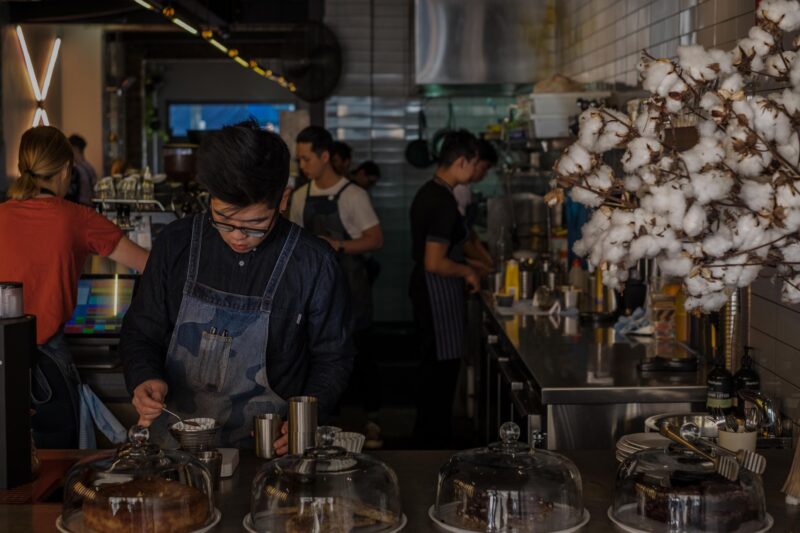Did you know that the hospitality industry has the lowest employee retention rate? Have you ever wondered what is causing that? Discover 5 ways to stop losing your restaurant staff. Reduce your employee turnover rate and the costs associated with this. Build a trustworthy and self-sustainable team.
Why a high staff turnover is bad for your business
The hospitality industry has an employee retention rate of 70%, according to Deloitte. This means that on average, 30% of employees switch jobs within a year. This accounts for almost double the average rate in other industries.
Some changes in staff can be healthy for a business. Disengaged employees leave, generating opportunities for new talent and new potential. Yet, an employee turnover rate higher than 20% becomes detrimental to the business.
Hiring comes at a much higher cost than retaining talent. You need to find the time, and a dedicated person in charge of hiring. You may need to pay an HR company or platform to advertise for the position. Assessing CVs and holding interviews takes time. On top of that, there is a productivity cost associated with the person leaving and also with the team who need to cover for them until a new person joins. In the US, the cost of replacing a $10 an hour employee can go beyond $3500.
As you may have figured it out already, losing employees can be bad for your business. So, what can you do to build a stronger team that will stay with you in the long run?
5 actionable things to stop losing your restaurant staff and build an awesome team
It is safe to assume than in a generally low paid industry, offering a higher salary than your competition would increase staff retention. Yet, we all know that the business finances don’t always make that possible. Plus, sometimes, money isn’t everything.
I don’t have to cover the part where I encourage you to avoid being a greedy manager who makes a huge profit but underpays their staff, right? I will assume that you’re not, or else you wouldn’t be reading this article.
If you care about your business and wish to make it work in a sustainable way, your staff should always come first. This will help you build a reliable team that will stay with your through the years and contribute to business growth. How do you do that?


1. Be transparent about your business goals and finances
Tracking financial figures, devising business plans and setting goals is management’s responsibility. Yet often, it is just management who knows where the business is going. This can mean that your staff won’t understand why they cannot get a raise, or what they can do to earn one. And without sharing this information, they won’t understand how they can bring value to the business.
Why discuss business goals and finances with your staff?
– Understanding where the business is heading will give them the opportunity to contribute in reaching those goals.
– It will make them feel empowered by being part of a bigger picture, rather than solely their specific role.
– It will help them understand how the business is doing and how that can impact upon their role and salary.
– They will feel more trusted.
How can you do it?
A practical solution is organising regular business goal setting meetings with your team. Monthly or quarterly would be a useful frequency to keep your staff up to date and engaged. While you may not wish to go into too much detail, you can share figures like revenue, costs and profit. You can discuss where you’d like the business to be and ask your staff for their collective input. Whatever the framework, do not dismiss team member’s ideas without discussing them first. And always document the outcomes of the meeting.
2. Build a personal, individual-focussed relationship with your staff members
Find our more about each one of your staff members, no matter how junior or senior they are. Ask them about their journey, about their goals, their family, their hobbies. Discuss how you can support them in their role, listen, and build an actionable plan. Ask them what they enjoyed in the previous month, what they found challenging. Discuss what they wish to get better at and how they can achieve that. It is important to listen carefully and take their feedback into account.
What are the benefits of building a strong leader – follower relationship?
– Focussing on the individual will help your staff members feel cared for and listened to.
– It will help you connect with them and vice-versa. This may lead to new ideas or discovery of facts and skills you may not have previously known of.
– In the long run, this will help your team be more honest in communicating with you.
How can you do it?
Monthly one to ones can be a great practical way to build stronger relationships with your staff members. It can be useful to document these conversations and look back to discuss progress. But remember: it is important to follow up on the discussions, and to avoid getting offended if you may hear something you don’t particularly like.
3. Bring well-being, work life balance and mental health into the spotlight
The restaurant industry is infamous for its high depression and suicide rate. And yet we only talk about it when famous chefs, like Anthony Bourdain end their life. There is immense value in making an effort to create a positive work environment. It will help you stand out from your competition and offer your staff a great incentive to stay.
Why focus on well being, work life balance and mental health?
It is obvious to say that taking care of staff’s well being will result in them being happier in their role. And happiness at work has been one of the hottest business topics, because it:
– Increases productivity
– Enhances engagement, loyalty and commitment
– Helps build stronger relationships
How can you do it?
Well-being, work life balance and mental health are vast topics. There is a multitude of ways to lead this, particularly in the restaurant industry. But first of all, you cannot expect your staff to work day and night. Especially when they are on low wages.
First of all, you should think about work life balance from a business perspective. What are your most profitable hours? What are your most profitable days? Do you need to be open all day? In that case you should consider multiple shifts. Can you limit your work day to your most profitable hours, for example, to dinner? In this case, your staff would have a lot more free time, and your loss would be minimal. A practice that is becoming more popular is to close the restaurant two days a week.
You should close the restaurant for a summer and winter break. And not just for a couple of days, but one, two or three weeks. This will help you recharge your batteries too. Plus, most customers would be on holiday too.
Finally, you can hire a specialist to offer individual counselling every couple of weeks or once a month.

4. Treat your restaurant staff as equals and encourage them to treat each other the same way
It is important to treat all your restaurant staff as equals, no matter whether they are dishwashers, chefs or front of house. Don’t shout at them, and don’t encourage shouting, particularly in the kitchen. Remember that your staff is under a lot of pressure for every service. Put yourself in their shoes and empathise with them on a human level.
Don’t put on a superiority hat when dealing with your restaurant staff. At the end of the day, you are still their manager and ultimately all business decisions are yours. But respecting your staff is key to building long lasting relationships.
Why you should encourage mutual respect
– Building work relationships as equals will increase your staff’s respect for you. Thus, they are more likely to be loyal to you. This is especially important when you may have to make a decision that affects their job.
– It creates a stronger team spirit based on mutual respect. Teams that are strong are more likely to perform better and stay longer in a workplace.
How should you do it? And what shouldn’t you do?
Don’t brag about drinking a wine as expensive as their monthly wage. Don’t flaunt your expensive clothes, or go through your holiday expenses. Have coffee with them at the beginning of their shift. Give them a hand if they are under a lot of pressure, from time to time. Stay longer hours with them if they are especially busy. Lend them moral support in these situations. Praise them when they have done something good. Even the smallest gesture can have a strong impact. Monitor your senior staff to make sure they also promote the same values.


5. Think about training opportunities, perks and other incentives
Job hopping is particularly common in lower paying jobs. And money only becomes less important when there are other incentives in place. Aside from respecting your staff, making sure they are happy, and empowering them, you need to also think about the perks you offer. These perks should act as incentives to engage your staff and strengthen the team. They can range from training, team building exercises, to small reward systems.
Why should you offer perks to your restaurant staff?
– First of all, very few restaurants do it, thus giving you an edge.
– This can empower your staff and make them feel cared for and valued.
– It can help them grow in their role, set higher goals and work harder to reach them.
What perks can you offer?
Employees tend to stay longer in their job when offered training opportunities. Customer service may be useful for your waiters. Leadership may be useful for your chefs. Working under pressure may be useful for the whole kitchen staff. Cooking school, or classes may be useful for some of your chefs. And what better opportunity to discuss this than your one to ones? Ask your staff what they would like to improve, and think about ways of supporting that. And you don’t even need to hire a professional to hold these training sessions. You can encourage skill sharing within the team. For example, once every two weeks one of your staff members (or yourself) teach the others something they may interest them.
But perks go far beyond training. You can reward your staff member(s) for reaching a certain goal. You can offer them a day off if they performed exceptionally well in the last 6 months. You can organise a night out after a specific number of positive customer reviews. And, at least once a year, you should take them out for a celebratory meal to a nice restaurant. This will make them feel valued, but also experience things as a customer rather than a restaurant worker.

Next steps
Now it’s time to build a plan. Which aspects would you like to focus on? When will you start implementation? Who will be responsible for it? How will you communicate it? Do you communicate it internally, or are you planning on having a PR push? No matter which route you will take, build a thorough plan and act on things methodically. And if you need a specialist to help you devise the plan, I’m here to help! Drop me an email and we can chat further.




